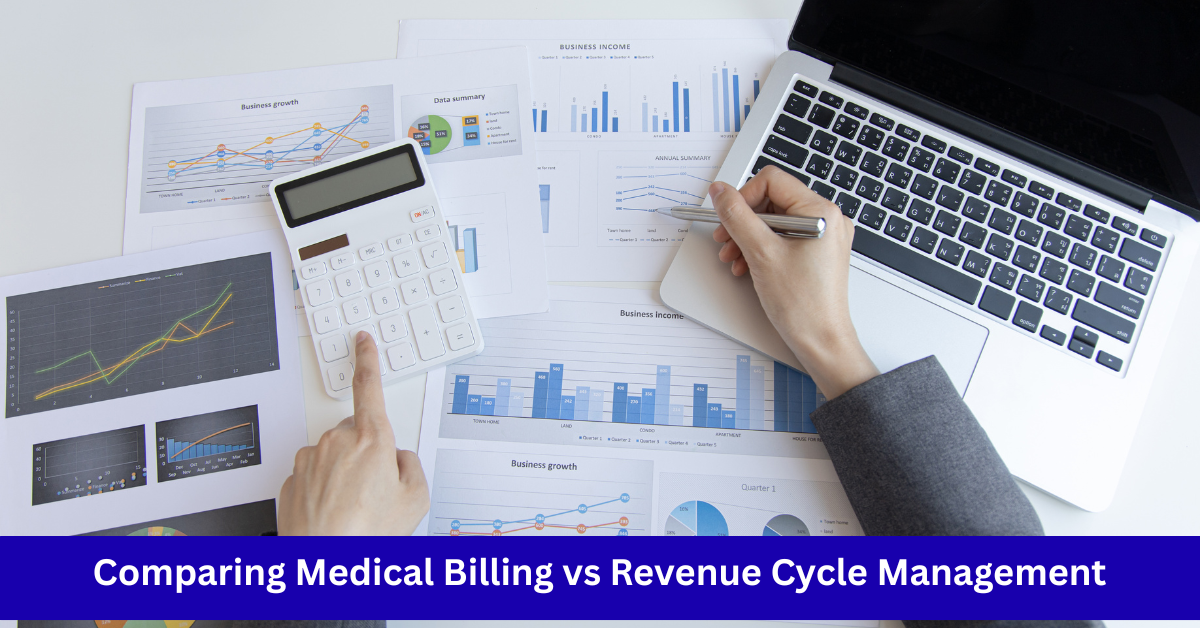
Healthcare organizations rely on accurate financial processes to stay sustainable while providing quality care. Two essential terms often come up: Medical Billing vs Revenue Cycle Management. At first, they might sound similar, but they serve different purposes in the healthcare system. Medical billing focuses on claims submission, while RCM covers the entire process from patient registration to final payment.
Understanding the difference between these two can help providers, clinics, and hospitals improve revenue flow, reduce errors, and increase patient satisfaction.
What is Medical Billing?
Medical billing is the process of translating healthcare services into standardized codes and submitting them to insurance companies for reimbursement. It includes generating claims, sending them to payers, and following up on denials or rejections.
For example, if a patient undergoes an X-ray, the billing department prepares a claim using procedure and diagnosis codes. The claim then goes to the insurer for payment. Medical billing ensures healthcare providers receive timely compensation for services provided.
What is Revenue Cycle Management (RCM)?
Revenue cycle management is broader than billing. It includes all financial activities related to a patient’s care journey, from scheduling an appointment to collecting final payments. RCM connects administrative, financial, and clinical functions to reduce delays and increase efficiency.
Think of RCM as the entire system, while billing is one part of that system. For instance, RCM covers patient eligibility checks, claims processing, denial management, collections, and financial reporting.
Medical Billing vs Revenue Cycle Management: Key Differences
Here’s a quick comparison table that highlights the differences:
| Feature | Medical Billing | Revenue Cycle Management (RCM) |
|---|---|---|
| Scope | Focuses only on claim preparation and submission | Covers the entire patient financial journey |
| Process | Coding, claim submission, and follow-up | Scheduling, registration, eligibility checks, billing, collections, reporting |
| Goal | Ensure timely payment for services | Optimize revenue flow, reduce denials, improve financial health |
| Role in Healthcare | Narrow and specialized | Broad and strategic |
This summary makes it easier to see why RCM is often considered the bigger picture.
Why RCM Matters More Than Billing Alone
While billing ensures payment for services, RCM identifies patterns that impact financial health. For example, if a clinic notices repeated claim denials due to missing insurance information, RCM addresses the issue at registration rather than waiting until billing.
As a result, healthcare providers improve cash flow and reduce administrative burdens. In contrast, focusing on billing alone may leave gaps that slow down payments.
Common Challenges in Medical Billing and RCM
Errors in Claims
Typos, incorrect codes, and missing details often lead to denials. A single error can delay payments by weeks.
Denial Management
Insurance companies frequently reject claims for small mistakes. Without an effective RCM process, many claims remain unpaid.
Patient Collections
Collecting payments from patients is increasingly difficult. Rising deductibles mean patients owe more, and poor communication can slow collections.
Compliance and Regulations
Both billing and RCM must follow strict regulations. A lack of compliance can result in penalties and revenue loss.
The Role of Technology
Modern software tools now simplify both billing and RCM. Automated coding, real-time eligibility verification, and denial tracking make processes more accurate. For example, artificial intelligence tools can flag claims likely to be denied before submission.
Additionally, electronic health records (EHR) integrate financial and clinical data, which reduces duplication and errors.
Strategies to Improve Medical Billing and RCM
-
Staff Training: Well-trained staff reduce errors in coding and claims submission.
-
Automation Tools: Using billing and RCM software speeds up processes and reduces human mistakes.
-
Regular Audits: Checking claims and payments regularly helps identify gaps early.
-
Clear Communication with Patients: Explaining bills and insurance terms improves collections.
-
Data Analytics: Tracking denial trends and payment cycles helps providers make informed decisions.
Real-Life Example
Imagine a medium-sized clinic. If it focuses only on billing, it may get claims paid but still struggle with frequent denials and late patient payments. However, when the same clinic implements RCM, it begins verifying insurance upfront, educating patients about costs, and tracking denials. Within months, the clinic sees fewer delays and higher revenue collection.
This shows how RCM creates long-term stability compared to billing alone.
Future Trends in Billing and RCM
The healthcare industry continues to adopt automation, machine learning, and predictive analytics. These tools will soon play a major role in forecasting revenue, detecting fraud, and personalizing patient financial communication.
Providers who embrace these trends will likely see stronger cash flow and improved patient experiences.
Key Takeaways
-
Medical billing is a part of RCM, focusing only on claims.
-
RCM is broader, covering everything from registration to collections.
-
RCM reduces denials, improves revenue flow, and strengthens compliance.
-
Using technology, automation, and analytics enhances both processes.
FAQs
1. What is the main difference between medical billing and revenue cycle management?
Medical billing focuses only on claim preparation and payment, while revenue cycle management covers the entire financial process from registration to collections.
2. Can a clinic survive with billing alone?
Yes, but it may face delays, denials, and collection issues. RCM ensures smoother cash flow and fewer errors.
3. Why is denial management important in RCM?
It helps recover lost revenue by correcting errors and resubmitting claims quickly.
4. How does technology support RCM?
Automation tools, EHR systems, and AI-driven software streamline billing, reduce errors, and predict claim outcomes.
5. Which is more beneficial: outsourcing billing or RCM?
Outsourcing RCM often brings greater benefits since it covers the entire financial cycle, not just claims.